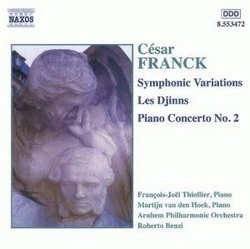| All Artists: Cesar Franck, Roberto Benzi, Arnhem Philharmonic Orchestra, Francois-Joël Thiollier, Martijn van den Hoek Title: Franck: Symphonic Variations; Les Djinns; Piano Concerto No. 2 Members Wishing: 0 Total Copies: 0 Label: Naxos Release Date: 2/19/2002 Genre: Classical Styles: Forms & Genres, Concertos, Theatrical, Incidental & Program Music, Instruments, Keyboard, Symphonies Number of Discs: 1 SwapaCD Credits: 1 UPC: 730099447225 |
Search - Cesar Franck, Roberto Benzi, Arnhem Philharmonic Orchestra :: Franck: Symphonic Variations; Les Djinns; Piano Concerto No. 2
 | Cesar Franck, Roberto Benzi, Arnhem Philharmonic Orchestra Franck: Symphonic Variations; Les Djinns; Piano Concerto No. 2 Genre: Classical
|
Larger Image |
CD Details |
CD ReviewsSolid Performances and a Surprise 02/22/2002 (5 out of 5 stars) "This disc will be a must-have for Franckophiles when they realize their composer wrote a full-fledged piano concerto (not one but two, the first being lost)! Fortunately, both performances and recording are much more than adequate, so even if you have current versions of "Variations Symphoniques" or "Les Djinns, you'll get fine alternate versions. In fact, I can't imagine a better performance of Franck's strange but memorable tone poem "Les Djinns," which has a big solo piano obbligato part. Francois-Joel Thiollier, whom I've enjoyed in other Naxos releases, plays with fervency and when needed, great delicacy here, and the Arnhem Philharmonic color Franck's typical orchestral writing in requisitely dark, almost funereal tones. In the familiar "Symphonic Variations," Thiollier is no less solid. He may not be quite as characterful as or bring quite as much sparkle to the finale as my favorite performer in the piece, Jorge Bolet, does, but Thiollier's is a noble performance nonetheless, and certainly the more difficult variations in this difficult work pose no problems at all for his formidable technique. So, then, what does the Piano Concerto No. 2--written in 1835, when Franck was all of 13(!)--sound like? The keyboard writing has much of Hummel about it (especially in the second movement). That makes sense, since Hummel (d. 1837) was the model for much of the piano music being turned out in the 1830s, including Chopin's. There is something of Chopin, too, in Franck's concerto, including the slightly awkward orchestration which like Chopin's is rather bottom heavy, given the mostly airy piano writing. But, wait: The orchestration also suggests the later Franck, recalling the special coloration Franck borrowed from the organ for his distinctive orchestral palette. Is the music itself especially memorable? No, being as I said pretty conventional in nature. But it is certainly fluent and especially in the last two movements pretty well put together. Certainly, it is the work of composer mature well beyond his years. Here, Dutch pianist Martijn van den Hoek takes over keyboard duties and plays with the kind of seriousness and dedication the piece deserves. I really can't imagine a much superior performance of this work, either. The orchestra is again fine, directed as they are by Roberto Benzi, whom I've always thought an underrated conductor. The recorded sound, too, is properly weigthy without any clouding (the brass and woodwind shine forth tellingly, when Franck lets them). Altogether, this CD is a pleasant surprise and a welcome addition to the Franck discography." Splendid Performances D. A Wend | Buffalo Grove, IL USA | 10/07/2009 (5 out of 5 stars) "Cesar Frank was groomed by his father to be a virtuoso pianist from an early age. Frank himself wanted to become a composer and when he was studying at the Conservatoire in Liege took lessons in composition and piano. He continued his studies in Paris until his father withdrew him as a student so he could begin a career as a performer.
This is where the Piano Concerto No. 2 comes in. Frank composed the work in 1835 when he was just 13 as a concert vehicle. This is a work of maturity for a teenager. The style is influenced by the Romanic piano concertos of the period. I do not detect a dominant influence and the music follows the conventional concerto structure. The music itself is engaging but not a profound statement. There is a long orchestra introduction in the first movement and the soloist enters with an engaging melody. The Adagio has a pastoral feel to the music with a lush melody explored by the soloist and orchestra. The Rondo finale begins, as do all of the movements, with an orchestral introduction. The soloist begins with a bold melody and there is a nice interplay between soloist and orchestra. Frank did not make much of an impression as a pianist early on, resorted to teaching piano, and built a reputation as an organist. Frank's pupils encouraged him to compose again and he became friends with Vincent d'Indy. In 1884, he compose Les Djinns based on a Victor Hugo poem. Les Djinns is a symphonic poem for piano and orchestra. The Djinns are an army of vampire-like monsters that terrorize the poet who observes the dangerous creatures. The piece is evocative of the poem and is highly dramatic with a marvelous part for the piano. The Symphonic Variations was composed in the following year. It is a bravura piece for the pianist brimming with inventive melodies. The music is beautifully performed by the Arnhem Philharmonic Orchestra and Roberto Benzi provides a magnificent reading. The pianists are not known to me but they pay the works with true passion. Martijn van der Hoek in the piano concerto is excellent and Francois-Joel Thioller is terrific in the Variations and Djinns. " |

 Track Listings (5) - Disc #1
Track Listings (5) - Disc #1